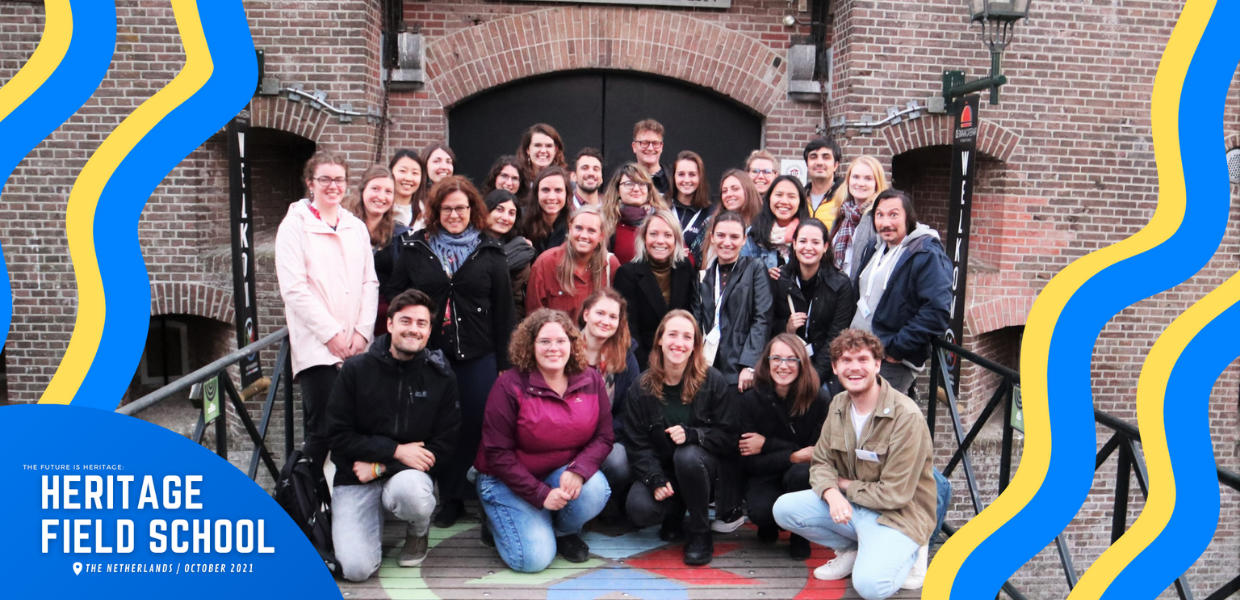Thank you for speaking to us today! What can you tell us about the Future is Heritage?
Thank you for having us! The Future is Heritage is an international network of young professionals, students, and enthusiasts that work or want to work in the European cultural heritage sector. We were founded in 2018 by the Dutch cultural heritage organisation Erfgoed Brabant, with the support of several partners, including Erfgoed Gelderland and Europa Nostra.
As a network, we strive for a more inclusive, equal and diverse sector by providing a platform where young people can show their talents, exchange knowledge and experiences with like-minded people, and participate in intergenerational conversations and collaborations. By hosting conferences, field schools, and other activities annually, we aim to build a strong creative, innovative community!
What projects are you currently focusing on?
Currently we are focusing on an event that we intend to host later this year. During this event, which we will host in the context of the European Year of Youth, we will try to put an even bigger focus on intergenerational cooperation and dialogue than we have before. We are also focusing on intensifying our collaboration with like-minded organisations and networks. We have seen so many impressive and great initiatives, for instance, the activities hosted by ESACH, and believe that by joining forces the impact of our initiatives can only be extended even further.
A major event of yours last year was Heritage Field School - can you tell us a bit more about it?
This was an event which we hosted in October 2021 in Arnhem (The Netherlands) and its surrounding area. After many lockdowns due to the COVID-19 pandemic, we were very fortunate to be able to organise a live event! During the Field School, participants tackled issues from the European heritage field and challenges we all must face in our day-to-day life. For instance, how do we deal with the effects of climate change on cultural heritage? How do we make heritage inclusive and create a space where many different perspectives can be shared? How do we assign new meaning to monuments that have fallen out of use?
We invite everyone to think with us and work on possible solutions for these issues. If you have ideas, an interesting project, or an approach, you can always get in contact (via [email protected]), and we will gladly explore how we can apply this in our activities.
What role does digital technology, practices or engagement play in your work?
In the world of today, it is almost impossible not to undertake some sort of digital engagement or practice. As we saw through our Online Programme in 2020 (which, due to the COVID-19 pandemic, we offered instead of our in-person event), through digital technology we can connect and engage large numbers of people in many different ways, ways that we did not know before. Digital accessibility contributes to democratising the European heritage sector, as wherever you are, you are able to contribute to international debate and let your voice be heard throughout Europe and beyond. As the Future is Heritage, we are still exploring all the possibilities that digital technology can bring us to strengthen our network, improve our quality and expand our outreach.
What advice would you give someone just beginning their career in the cultural heritage sector? What opportunities should they take advantage of - and what challenges do they face?
I feel the professional journey of every individual is different. However, speaking from my own experience, I would advise you to always look beyond your own profession, work, culture, or region. As I discovered myself as a participant in previous Future is Heritage events, there are many like-minded people who face the same issues, but maybe they live on the other side of the continent. By attending events and taking part in network activities, you can exchange experiences and possible solutions with each other that can help you in your own work and development.
What advice would you give to a cultural heritage institution who would like to involve and support students and new professionals in their work?
I believe that you can support new professionals and students in many ways as a heritage institution. For example, by hiring young professionals in your organisation and providing substantive positions for interns you can create a gateway to acquire new perspectives, ideas, and dynamics. Through this, new professionals and students acquire concrete experiences and the opportunity to develop their own skills. It is a two-way street.
Do not be scared to learn or try out new things, create a space for new ideas, and don’t be afraid to give new professionals or students some control. Our world is dynamic and continuously changing and evolving. Why shouldn’t heritage organisations and institutions, that are usually all about our world, do the same?
Do you have any plans for the European Year of Youth?
Yes, we do! The event we will host in the fall will be in light of the principles of the European Year of Youth. In addition to this, we hope to also host some (online) activities to invite even more people to exchange and share ideas, experiences, and knowledge and work towards a brighter future.
How can a student or new professional join The Future is Heritage?
Joining the Future Heritage is very simple! Just follow us on social media (Twitter, Facebook, LinkedIn and Instagram) , keep an eye out on our website and join one of our activities or events! We have not structured a membership, intake interviews, or any other requirements, so you are free to join anytime.



